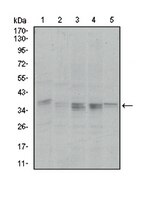MABN690 Sigma-AldrichAnti-PPP1CA Antibody, clone 5E9
Anti-PPP1CA Antibody, clone 5E9 is a highly specific mouse monoclonal antibody & that targets Serine/threonine-protein phosphatase & has been tested in western blotting.
More>> Anti-PPP1CA Antibody, clone 5E9 is a highly specific mouse monoclonal antibody & that targets Serine/threonine-protein phosphatase & has been tested in western blotting. Less<<Recommended Products
Overview
| Replacement Information |
|---|
Key Spec Table
| Species Reactivity | Key Applications | Host | Format | Antibody Type |
|---|---|---|---|---|
| H | WB | M | Ascites | Monoclonal Antibody |
| References |
|---|
| Product Information | |
|---|---|
| Format | Ascites |
| Control |
|
| Presentation | Mouse monoclonal IgG1 ascitic fluid containing up to 0.1% sodium azide. |
| Quality Level | MQ100 |
| Physicochemical Information |
|---|
| Dimensions |
|---|
| Materials Information |
|---|
| Toxicological Information |
|---|
| Safety Information according to GHS |
|---|
| Safety Information |
|---|
| Packaging Information | |
|---|---|
| Material Size | 100 µL |
| Transport Information |
|---|
| Supplemental Information |
|---|
| Specifications |
|---|
| Global Trade Item Number | |
|---|---|
| Catalogue Number | GTIN |
| MABN690 | 04053252917424 |
Documentation
Anti-PPP1CA Antibody, clone 5E9 SDS
| Title |
|---|
Anti-PPP1CA Antibody, clone 5E9 Certificates of Analysis
| Title | Lot Number |
|---|---|
| Anti-PPP1CA, clone 5E9 - QVP1305167 | QVP1305167 |
| Anti-PPP1CA, clone 5E9 - VP2203152 | VP2203152 |
| Anti-PPP1CA, clone 5E9 - VP2301251 | VP2301251 |
| Anti-PPP1CA, clone 5E9 Monoclonal Antibody | VP1806151 |







